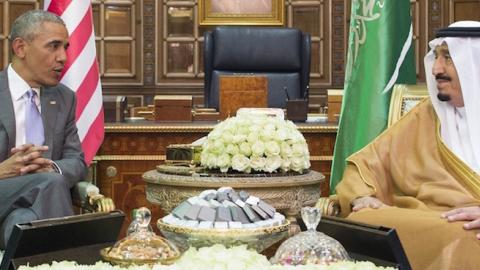The Kingdom of Saudi Arabia has become the new favored piñata by the chattering classes in Washington. “They’re worse than Iran!” is the refrain, echoed by those who defend Tehran’s unceasing provocations, even following the nuclear deal.
The House of Saud has been on the receiving end of a particularly aggressive string of attacks as of late. Partly spurred on by former Sen. Bob Graham’s one-man campaign, outlets as diverse as Fox News, CBS, and PBS have recently pushed the narrative that the kingdom abets terrorism and fuels Islamist extremists globally. This chorus was recently echoed by Sen. Christopher Murphy’s attempt to severely restrict U.S. weapons sales to Saudi Arabia.
The anti-Saudi campaign picked up steam following the conclusion of the nuclear deal with Iran, as many Washington analysts began to advocate for normalization of relations with Tehran to “counterbalance” Riyadh. These critics warn that Saudi Arabia should no longer be viewed as a staunch ally and that the United States ought to disavow the kingdom as a mainstay of stability in a volatile Middle East.
On face value, it is easy to jump to the conclusion that Saudi Arabia — the birthplace of Osama bin Laden, Wahhabism, and an absolute monarchy that adheres to Islamic law — is an engine of global Islamist extremism. But the fact is that Washington needs Saudi Arabia today more than ever if it is to defeat the so-called Islamic State, al Qaeda, and their global offshoots.
Beltway pundits have recently latched on to a thinly sourced “60 Minutes” segment accusing the Saudi government, and by extension the royal family, of involvement in the 9/11 attacks. They claim that the redacted 28 pages from the 9/11 Commission report could offer “explosive” new revelations about Saudi complicity in the attacks.
Sorry, but the facts suggest that the exact opposite is true.
Saudi Arabia has long been at war with al Qaeda and its extremist affiliates. In August 1996, bin Laden called for jihad against both the United States and Saudi Arabia with the publication of his first fatwa. The 30-page “Declaration of War Against the Americans Occupying the Land of the Two Sanctuaries” prompted the kingdom to revoke the al Qaeda leader’s Saudi citizenship and to divest him of his family fortune.
The kingdom’s conflict has continued in more recent years. In December, the Saudi defense minister established a coalition of 39 Muslim-majority countries with a specific mandate to combat al Qaeda, the Islamic State, and the Shiite terror group Hezbollah. Saudi counterterrorism security forces are on the front lines every day taking the fight to al Qaeda; hundreds of Saudi security officers have been killed in the line of duty at home, fighting Islamist militants. As recently as April 5, militants attacked and killed a senior Saudi security officer outside Riyadh.
U.S. intelligence and security officials have been particularly effusive in describing the important role Saudi Arabia has played in cutting off the sophisticated global network of illicit finance used by terrorists. According to the State Department, “Al Qaeda in the Arabian Peninsula’s lack of success in Saudi Arabia can be attributed to the Saudi government’s continued domestic and bilateral efforts to … counter terrorism and violent extremist ideologies.”
The truth is plain: Americans are safer today because the kingdom has foiled numerous al Qaeda terrorist plots targeting the U.S. homeland. Adam J. Szubin, Treasury undersecretary for terrorism and financial intelligence, recently praised the kingdom’s aggressive stance against terrorism as reflecting “the strength of U.S. and Saudi cooperation on countering the financing of terrorism.”
As for the redacted 28 pages from the 9/11 Commission report? Well, the commission put to rest accusations of complicity, confirming in their report that there is no evidence that the Saudi government supported or funded al Qaeda. According to the report, the commission “found no evidence that the Saudi government as an institution or senior Saudi officials individually funded the organization.” In federal court, on three occasions — 2006, 2008, and 2015 — lawsuits accusing the kingdom of terror sponsorship were dismissed. Further illustrating the absurdity of the notion that the Saudis have something to hide is the fact that the Saudi government itself, since 2003, has called for the declassification of the 28 pages.
President Barack Obama, however, has labeled the Saudis “free-riders,” criticized their ideology and treatment of women, and recommended they share the Middle East and North Africa with Iran. Obama’s deputy national security advisor, Ben Rhodes, has gone further — accusing the Saudis of not doing enough to prevent rogue wealthy royals from funding extremists. “It’s not that it was Saudi government policy to support al Qaeda, but there were a number of very wealthy individuals in Saudi Arabia who would contribute,” he said. “[T]here was, at certainly, at least kind of an insufficient attention to where all this money was going over many years from the government apparatus.”
But Saudi Arabia doesn’t sponsor terrorism — in fact, it’s been an ally in the fight against al Qaeda and is key to destroying the Islamic State. That’s an inconvenient fact for those trying to establish a moral equivalence between Iran and Saudi Arabia. In fact, it’s Tehran that continues to sabotage U.S. counterterrorism efforts.
How many terror plots has Iran helped the U.S. thwart? None. Did Iran stop Syrian dictator Bashar al-Assad from facilitating the flow of al Qaeda fighters into Iraq to kill American soldiers there? Of course not. Instead, Iran’s leaders continue to direct attacks against U.S. interests, resulting in the deaths and maiming of American soldiers. It is a bitter pill to swallow that our country should be seeking to “normalize” relations with those behind the 2007 joint Iranian Revolutionary Guard and Lebanese Hezbollah attack that resulted in the kidnapping and execution of American servicemen.
Iran’s actions are bad enough, but the web of jihadist proxies its sponsors around the Middle East is even worse. Saudi Arabia, unlike Iran, has declared Hezbollah a terrorist organization. And make no mistake about it, Hezbollah still has the United States and Israel in its crosshairs.
For nearly 70 years, Washington has had a reliable partner in Riyadh. Meanwhile, since the 1979 Islamic Revolution in Iran, the United States has faced nothing short of outright hostilities from a state bound by its constitution to export its brand of Shiite extremist Islam throughout the Middle East.
Iran and its surrogates are happy to create the conditions conducive for terror to thrive, while offering Janus-faced support to mask its hegemonic aspirations only believed by the Obama administration. Supreme Leader Ali Khamenei has not changed his anti-American tone following the nuclear deal: He recently accused the United States of supporting the Islamic State, and has struck a militaristic stance toward the West. “Those who say the future is in negotiations, not in missiles, are either ignorant or traitors,” he said last month.
The notion that Saudi Arabia must somehow “share” the region with Iran, as Obama declared in his recent interview with the Atlantic, implies that security and stability in the Middle East can be best maintained by acknowledging the legitimacy of Iran’s suzerainty.
But there are real security consequences to allowing Iran gain the upper hand over Saudi Arabia. For example, if Iran — through its Shiite Houthi militia proxies — were to gain control of the strategic Bab al-Mandab strait in Yemen, it would significantly increase its capacity to funnel weapons and rockets to Palestinian and Hezbollah militants, further destabilizing the Levant. Meanwhile, Iran’s increased support to Assad following the nuclear deal has shifted the balance of power toward the Syrian regime, and further alienated the very Sunnis the United States needs to fight the Islamic State.
Yet Iran continues to press its case as a responsible partner with the international community against Sunni extremism. Earlier this year, its foreign minister argued in a New York Times op-ed that Saudi Arabia was the root of instability in the region and that only by partnering with a strong Iran could the West hope to eradicate terrorism.
However, recently declassified documents and multiple U.S. Treasury Department designations strongly suggest a much cozier covert relationship between al Qaeda’s henchmen and Iran than many would suspect. The Treasury Department sanctions describe the actions of senior al Qaeda weapons and logistical facilitators who were, at various times since 2006, active in Tehran.
It’s become fashionable to bash Saudi Arabia today. But to look to Iran as an antidote to global Islamist extremism and ignore Saudi’s real, tangible, counterterror accomplishments would be dangerous folly. Now more than ever, we must work with our Sunni allies to curb Iran’s influence, keep it from obtaining a nuclear weapon, and prevent it from further destabilizing the Middle East.



















